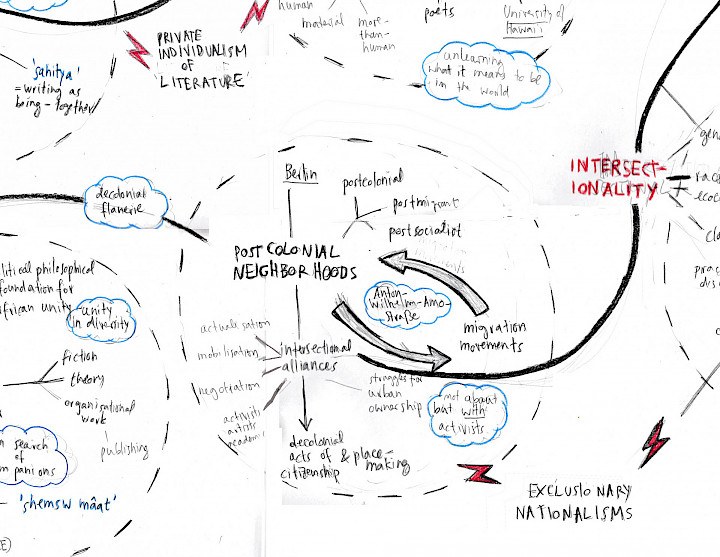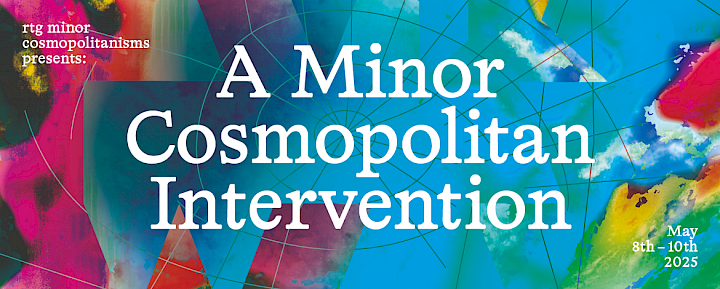[Event] Sensory Democracy: Can the Left Reclaim the Topology of Affect?
Time: 9th May 2025 | 20:00
Location: Reinickendorfer Straße 17 | 13347 Berlin
Language: The event takes place in English
Entry: Free. Donations are welcome
Access: Our space is accessible by wheelchair

By Arjun Appadurai (New York/Berlin)
With contributions by Bonaventure Soh Bejeng Ndikung (HKW Berlin), Regina Römhild (HU Berlin) & Dirk Wiemann (U Potsdam)
Organised and moderated by the Collaborations Research Unit team and the Minor Cosmopolitan Intervention team
One reason for the remarkable rise of right-wing icons, parties and ideologies in many parts of the world is that the right-wing has successfully captured the terrain of affect (of love, anger, fear, as well as of social solidarity and activist energy). And one reason for this capture is that the Left has remained confined to the power of theory, argument and rational debate. What would it take for the Left to reclaim affect, and build new adjacencies, networks and affinities on this basis?
We cordially invite you to join us for an intervention by Arjun Appadurai with Bonaventure Soh Bejeng Ndikung, Regina Römhild and Dirk Wiemann. The event is part of the Minor Cosmopolitan Intervention, a conference by the RTG minor cosmopolitanisms, funded by the DFG (Deutsche Forschungsgemeinschaft). It also marks the start of the new DFG Research Unit Collaborations: Assemblages, Articulations, Alliances.
Keep checking the Minor Cosmopolitan Intervention website and the Collaborations Research Unit website for more information.

Arjun Appadurai is Emeritus Professor of Media, Culture and Communication at New York University and Visiting Professor at the Institute for European Ethnology at Humboldt University. He is a widely recognized expert on globalization, media, right-wing populism and cities. Appadurai is a Fellow of the American Academy of Arts and Sciences, and is the Consulting Curator for a project on "Sensing Democracy" at the HKW (in Berlin).
Bonaventure Soh Bejeng Ndikung is a curator, author and biotechnologist, currently serving as director and chief curator of Haus der Kulturen der Welt (HKW) Berlin, Germany and chief curator of the 36th São Paulo Biennale. He is the founder and was artistic director of SAVVY Contemporary in Berlin, as well as the artistic director of sonsbeek20–24, a quadrennial contemporary art exhibition in Arnhem, the Netherlands. He also worked as curator-at-large for Adam Szymczyk’s Documenta 14 in Athens, Greece and Kassel, Germany in 2017 and was guest curator of the Dak’Art biennale in Dakar, Senegal, in 2018. Additionally, he served as the artistic director for the 12th and 13th editions of the Bamako Encounters photography biennial in Mali, taking on this role in 2019 and 2022. Together with the Miracle Workers Collective, he curated the Finland Pavilion at the 58th Venice Biennale, 2019. Prof. Dr. Ndikung was a guest professor in curatorial studies and sound art at the Städelschule in Frankfurt, and he is currently a professor in and head of the faculty of Spatial Strategies Master’s program at the Weissensee Academy of Art in Berlin. He was the recipient of the first OCAD University International Curators Residency fellowship in Toronto in 2020. His published works include, inter alia, The Delusions of Care (2021), An Ongoing-Offcoming Tale: Ruminations on Art, Culture, Politics and Us/Others (2022) and Pidginization as Curatorial Method (2023).
Regina Römhild is a cultural anthropologist and professor at the Institute for European Ethnology, Humboldt UniversityBerlin. She is most interested in the further development of a postcolonial anthropology of Europe, and works in the fields of critical (post)migration and border regime studies, Mediterranean & political anthropology. She has established the Migration Lab and the Critical Europeanization Studies Lab at the Institute, and has intensively written about postmigrancy and postcolonial Europe. Among her current interdisciplinary engagements is the South African-German IRTG Transformative Religion and the RTG Minor Cosmopolitanisms. She just started the DFG funded transacademic collaborative research project Postcolonial Neighborhoods as part of the Research Unit Collaborations: assemblages, articulations, alliances.
Dirk Wiemann is Professor of English Literature at the University of Potsdam. He has, in numerous collaborative research projects funded by the DFG, DAAD and the UGC, extensively collaborated with partners in Indian universities, and has spent three years as a visiting lecturer at universities in Hyderabad and Delhi. Previous positions include the University of Delhi and the University of Hyderabad (India). He is the author of Anglophone Verse Novels as Gutter Texts: Postcolonial Literature and the Politics of Gaps (Bloomsbury Academic, 2023), Genres of Modernity: Contemporary Indian Novels in English (Brill 2008), and the co-editor of European Contexts for English Republicanism (Routledge 2013) and Perspectives on English Revolutionary Republicanism (Routledge 2014), among others. He is spokesperson of the Research Unit Collaborations: Assemblages, Articulations, Alliances.
